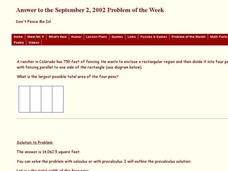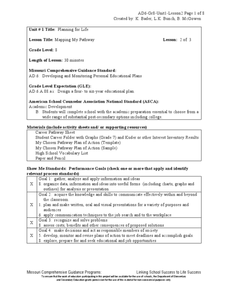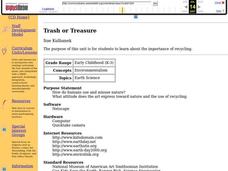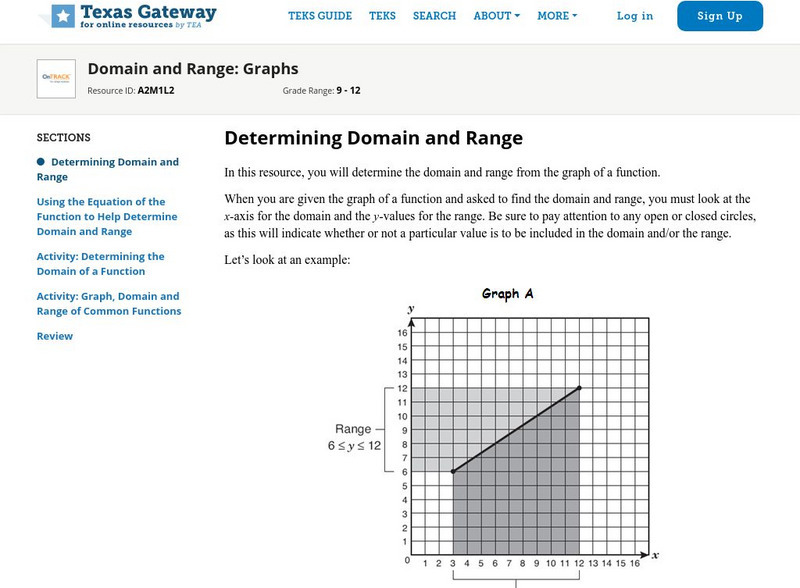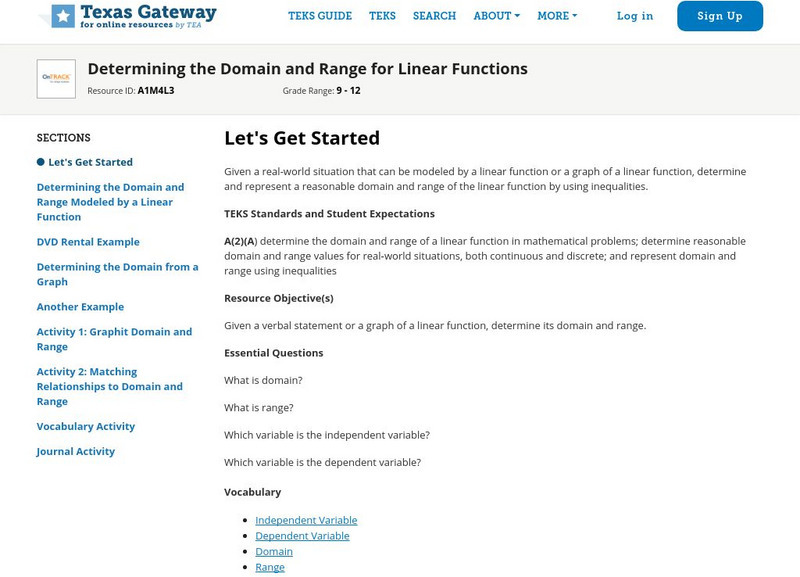Curated OER
Don't Fence Me In: Prisms
In this prism worksheet students explore the best way to divide a rectangular region into four areas using parallel lines. This one-page worksheet contains 1 problem. The answer is provided.
Curated OER
Fifty-Eight Inverse and On-To-One Questions
In this inverse function worksheet, students sketch inverses, find inverse functions, confirm pairs of functions are inverses, determine functions are one-to-one, and complete tables for one-to-one functions in fifty-eight questions.
Curated OER
Math Honors 2: Semester 1 Review
In this worksheet, learners review topics from Algebra 2. Topics include synthetic division, rational algebraic expressions, quadratic functions, imaginary number, composite functions, and inverse of a function. The three-page worksheet...
Curated OER
My Four to Six Year Plan (My Personal Plan of Study)
Eighth graders examine what they need to do to meet their career goals. They design a four to six year plan for the classes they need to take in high school after listening to high school mentor tell about their experiences with this...
Curated OER
Star Light...Star Bright
In this brightness of stars worksheet, students use a given formula using the temperature in Kelvins of a star to find its brightness. Students solve 4 problems using this equation.
Curated OER
Guetemala's Changing Forest
Eighth graders compare their local ecological zone to the tropical rainforest. In this natural ecology lesson plan, 8th graders complete an activity about the differences in ecological zones. They compare their biome to the Guatemalan...
Curated OER
Mapping My Pathway
Eighth graders create career portfolios, speak with the school counselor, and develop and educational plan. Individually, 8th graders discuss career options and how an educational plan can assist them in future goals. They explore...
Curated OER
Review for the Algebra One SOLs
Students review the standards for Algebra I. Using the text, they discover two problems that match each standard and solve them showing all steps on paper. They create a PowerPoint slide for each problem and go through the correct...
Curated OER
Classifying Functions
Eleventh graders sort different types of functions including rational, periodic, exponential, polynomial, quadratic, logarithmic and linear using "function cards." The functions are displayed in multiple representations including...
Curated OER
Words for Algebra
Young scholars rewrite word problems using symbols. In this algebra lesson, students relate algebra to the real world. They identify the correct steps to take when solving word problems.
Curated OER
Inverse Trigonometric Values
In this trigonometry worksheet, learners solve functions using the properties of inverse trig. They write out the 6 trigonometric functions in standard position and solve for missing angles. There are 15 questions.
Curated OER
Trash or Treasure
Students explore the importance of recycling. Students are read "Can Kids Save the Earth", they are then guided in a recycling project. Students discuss Earth Day, and make poster to promote Earth Day.
Curated OER
Why Does the Rule of 72 Work
In this algebra worksheet, students solve a word problem by rewriting it using algebraic symbols. They calculate the interest compounded over a period of time using the Interest Formula. This worksheet includes 1 problem and an answer key.
Pennsylvania Department of Education
Analyzing Numeric and Geometric Patterns of Paper Pool
Students use concrete and pictorial representation of geometric patterns to extend patterns. In this geometric patterns lesson plan, students identify patterns and extend them.
Curated OER
A.P. Calculus Prerequisite No Calculator Multiple-Choice and Free-Response Exam
In this A.P. Calculus pre-requisites learning exercise, students solve ten multiple-choice and ten free-response questions. Many of these questions cover trigonometric functions.
Curated OER
Quadratic Functions
In this algebra learning exercise, students perform transformations on quadratic functions. They describe the different properties of quadratic functions. There are 12 problems.
Curated OER
Exploring Centers of Triangles
Students explore properties of triangles using angle bisectors, incenters, circles, midpoints, and altitudes. They use Geometer's Sketchpad in order to create triangles and their properties.
Pennsylvania Department of Education
Alike and Different
Students compare and contrast objects and are introduced to a Venn Diagram. In this alike and different lesson, students make observations regarding properties of objects. Students classify object and build ideas about variables....
Texas Education Agency
Texas Gateway: Domain and Range: Graphs
Given a function in graph form, identify the domain and range using set notation, interval notation, or a verbal description as appropriate.
Texas Education Agency
Texas Gateway: Determining Reasonable Domains and Ranges (Verbal/graph)
Given a graph and/or verbal description of a situation (both continuous and discrete), the student will identify mathematical domains and ranges and determine reasonable domain and range values for the given situations.
Cuemath
Cuemath: Domain and Range of a Function
Explore the world of domain and range of a function in this mini-lesson. Learn how to find the domain and range of a graph, trigonometric functions, exponential functions, and domain and range equation. Includes examples and practice...
Texas Education Agency
Texas Gateway: Determining the Domain and Range for Linear Functions
Given a real-world situation that can be modeled by a linear function or a graph of a linear function, the student will determine and represent the reasonable domain and range of the linear function using inequalities.
Texas Education Agency
Texas Gateway: Domain and Range for Quadratic Functions: Restricted Domain/range
Given a situation that can be modeled by a quadratic function or the graph of a quadratic function, the student will determine restrictions as necessary on the domain and range of the function.
Khan Academy
Khan Academy: Domain and Range From Graph
Given the graph of a function, determine its domain or range. Students receive immediate feedback and have the opportunity to try questions repeatedly, watch a video, or receive hints.


